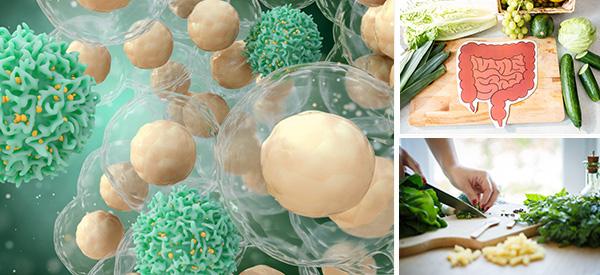
Top 5 Anti-Inflammatory Diet Changes for Autoimmunity
If you don’t have an autoimmune disorder yourself, chances are that you know someone who does. At last count, millions of people across the world are suffering from an autoimmune condition and the numbers are going up, although researchers aren’t sure why.
These diseases, which include Type 1 diabetes, multiple sclerosis, celiac disease, and rheumatoid arthritis, all make it hard for your immune system to distinguish the difference between your own cells and foreign invaders. As a result, it attacks healthy cells and tissues as well as pathogens, resulting in symptoms like abdominal pain, swelling joints, skin problems, and recurring fever.
Studies suggest that healthier lifestyles may help keep the immune system balanced, while situations that are less healthy can trigger it into overreacting. For example, several autoimmune diseases have been associated with obesity, such as MS, rheumatoid arthritis, and psoriasis. However, anti-inflammatory dietary choices can help lessen the symptoms of rheumatoid arthritis.
In this article, we’ll go over the top 5 diet changes that can improve your autoimmunity and help you enjoy life to the fullest once again.
1. Focus on Anti-Inflammatory Foods
This diet change, which is similar to the popular Mediterranean diet, can be especially beneficial for those with rheumatoid arthritis. Choose anti-inflammatory foods such as fish, olive oil, fruits, vegetables, legumes, nuts, and seeds. Whenever possible, eat fresh-caught fish and make your own meals, since you will be sure what ingredients were used.
Examples of dietary adjustments include: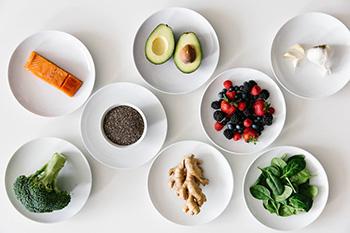
- Make certain you eat foods that are high in omega-3s and protein, such as salmon, walnuts, hemp seeds, and chia seeds. Add chia seeds and hemp seeds to smoothies and top your salads with wild salmon.
- Try adding a spinach or arugula salad to lunch or dinner. Dark leafy greens are rich in antioxidants and nutrients that help prevent damage to healthy cells and reduce inflammation. Furthermore, they contain magnesium, a mineral vital to a healthy immune system.
2. Try Paleo
There is a more intense version of the Paleo diet which has made a difference in the lives of those with inflammatory bowel disease conditions like Crohn’s disease and ulcerative colitis. The AIP (Paleo autoimmune protocol) diet, which is based on the types of foods eaten by our Paleolithic ancestors, requires you to assess and possibly avoid foods and ingredients like grains, legumes, dairy products, refined sugars, industrial seed oils, eggs, nuts, seeds, nightshade vegetables, gum, and food emulsifiers.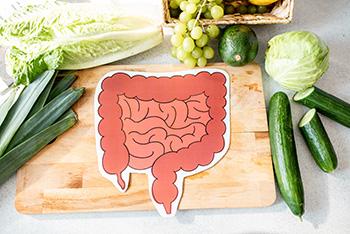
AIP consists of an elimination protocol whereby food groups that could cause inflammation are eliminated from the diet, then slowly added back in. Since there is no general rule for which foods are the most detrimental, you generally start with the cleanest possible diet and slowly add excluded foods to determine which ones trigger your autoimmune response.
This diet is comparatively restrictive, so it might not be an ideal option if you are at risk for malnutrition or nutritional deficiencies. However, at least one study showed that people with IBD witnessed a significant reduction in gut inflammation.
3. Eat More Probiotics AND Prebiotics
Fermented foods, like sauerkraut and miso, are loaded with probiotics, which help balance the gut microbiome and improve the intestine’s barrier function. Both of these functions are essential to protecting against autoimmune disorders. People with rheumatoid arthritis who take probiotics tend to experience a significant reduction in stiffness, swelling, pain, and inflammation.
Good probiotic sources include pickled ginger, fermented vegetables, kombucha, and coconut yogurt with added probiotics. Try serving sauerkraut as a side dish for your meals, using tempeh as a meat replacement, or drinking probiotic-rich beverages like kombucha and kefir.
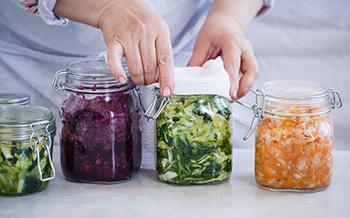
Prebiotics aren’t as well-known, but they’re still important for a healthy digestive system because they work together with probiotics to support overall body health. Try eating asparagus to promote friendly gut bacteria and help calm inflammation or bananas to improve muscle relaxation and reduce bloating. Other good sources of prebiotics include dandelion greens, apples, chicory root, and garlic.
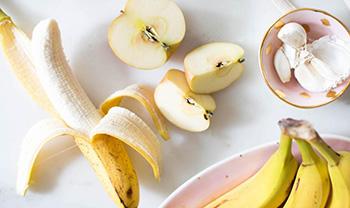
Related:
- How To Make Medicinal Pickled Turmeric
- How To Make An Anti Inflammatory Herbal Jar (Pickled Purslane)
- How To Prepare Medicinal Pickled Garlic
4. Try Gluten Free
Gluten is a protein found in wheat, rye, and barley that damages the small intestine in people with celiac disease. Being a large molecule. It easily triggers an immune response, which is why so many healthcare practitioners recommend that those with an autoimmune disease go gluten-free.
Doing so can be difficult at first, as gluten is now found nearly everywhere. Besides bread and pasta, it is also used in medications and supplements, as well as meat substitutes. Furthermore, gluten can be found in body products such as toothpaste, as well as in “gluten-free” foods after cross-contamination occurs.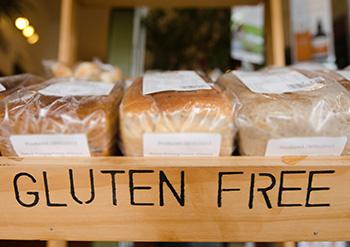
Start by filling your plate with naturally gluten-free foods, such as vegetables, fruits, beans, nuts, seeds, fish, and lean meat. You can still eat grains if you enjoy them: many people think that gluten-free means not eating grains at all, yet there are lots of great options out there. Examples include rice, millet, quinoa, and buckwheat. Nowadays, you can even find gluten-free pasta made from corn, quinoa, or beans!
To avoid cross-contamination, prepare your own meals from scratch as much as possible. If you want or need packaged foods, check the label thoroughly to confirm that it is gluten-free.
5. Eat More Turmeric
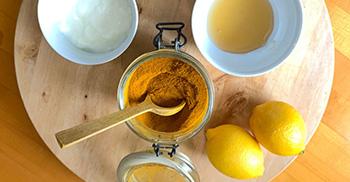 Curcumin, the active ingredient in this bright orange spice, has been shown to alleviate multiple sclerosis, rheumatoid arthritis, psoriasis, and inflammatory bowel disease by regulating inflammation in the body.
Curcumin, the active ingredient in this bright orange spice, has been shown to alleviate multiple sclerosis, rheumatoid arthritis, psoriasis, and inflammatory bowel disease by regulating inflammation in the body.
While the anti-inflammatory properties of turmeric may assist in soothing symptoms associated with other types of autoimmune disorders, curcumin can be hard for the body to absorb, so you’ll have to prepare it strategically. Turmeric is best absorbed when combined with healthy fats and black pepper, so add both to scrambled eggs, stir-fries, and soups.
Dr. Nicole’s Apelian Herbal Support for MS
Beyond diet, I’ve found the herbal tinctures in my Warrior Bundle to be exceedingly valuable for keeping the symptoms of fatigue, brain fog, and muscle weakness in remission. So much so that I use them every day. I believe these tinctures are also helpful for other forms of autoimmune disease. The bundle, which includes Lion’s Mane, Turkey Tail, Balanced (Leaky) Gut Tincture, Usnea, Blue Elderberry, and my All-Purpose (First Aid) Salve, can be found in the Apothecary.
The combination of a ketogenic diet, intermittent fasting, and the herbs in my Warrior Bundle have truly transformed my health by significantly reducing my multiple sclerosis symptoms. It’s my greatest hope that this personal story of healing will assist you in overcoming your own challenges with autoimmunity.
Conclusion
Gut health has a direct effect on the immune system, and healing a damaged gut may manage autoimmune conditions. By making anti-inflammatory diet choices, consuming prebiotics ( and probiotics, taking your herbal tinctures and getting plenty of sleep and exercise, you can improve your quality of life and manage your condition instead of letting it always manage you.
You may also like:
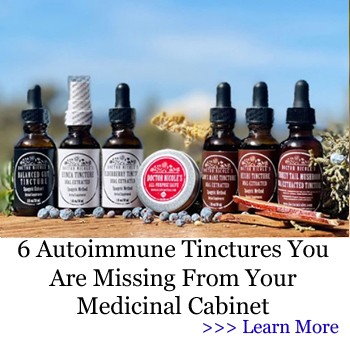 10 Most Powerful “Autoimmune Herbs” (Anti-Inflammatory)
10 Most Powerful “Autoimmune Herbs” (Anti-Inflammatory)
How To Make An Anti Inflammatory Herbal Jar (Pickled Purslane)

I used to have severe pain on the middle finger of my left hand. By drinking 17 ounces of fluoride free filtered water with two tablespoons of organic apple cider with the mother in the morning first thing, and drinking Ganoderma coffee with cashew milk with turmeric, ginger, cinnamon, black pepper and raw honey on it, I got rid of the pain in few weeks!!! Of course, I avoid gluten as much as possible too. Just sharing!
Hi Nydia, just wanted to chime in that I also like to a ‘golden coffee’ of sorts in the morning.. for me, organic drip brew, almond mylk, a little of Laird’s supercreamer w/ various mushroom extracts, turmeric, whole goji berries, and a lil’ chili powder, sweetened w/ local honey or maple syrup. I’ve got it fine tuned now and can hardly take coffee any other way! I love getting a nice dose of superfoods first thing, along w/ water and I also add ACV (which I highly recommend that everyone do!). Anyhoo 💜✌️🍗
I love all the information you’ve made accessible for us to utilize thank you 🙏
Good info thank you
Hi, Rice, and Corn is a Gluten.
Wild rice is ok,
Rice is not gluten.
Corn in one of the worst inflammatory veggies there is, unfortunately.
Wheat, Rye, Barley and Oats are gluten or very close to being gluten. Oats are technically not gluten but they have almost the same effect as gluten.
Often machinery harvesting oats has been cross contaminated with wheat so it has traces of gluten in it.
Rice mimics Gluten and is one of the hidden gluten. You can find this on Dr. Peter Osborne.
Is that both white and whole grain rice?
I’ve been gluten intolerant for 6 years. Rice is one of the grains you can have and does NOT have gluten in it. I go to Celiac.org for information and of course, I always check with my gastroenterologist.. Rice is starchy but that doesn’t mean it contains gluten. Gluten is gliadin and is found in wheat, barley, rye, triticale, malt, brewer’s yeast. ALL rice is gluten free.
Ecoterrorists are wanting to ban meat.
Going to be hard to do a paleo diet without it.
All I am trying to say is for the people that are having issues with Ulcerative Colitis, Crohn’s Disease rice is gluten, I know this for I have Ulcerative Colitis and that was a big issue for me in till I did a lot of internet searching and I came across DR Osborne and found out about rice. I stopped eating it and that was one of my issues..
if you can eat rice and are doing ok then go for it. I hope this helped some people.
Do you sell any kind of product with the combination of anti inflammatory herbs you’ve mentioned? Although I am a great lover of plants and gardening, my arthritis has progressed to the point that I cannot move around much and would rather purchase something than grow and prepare it myself.
IMHO It’s an autoimmune disorder, till someone finds the real cause your body is attacking itself, trying to get at the hidden pathogen. Ulcers were our fault, stressful life etc. Until they found H-pylori. Which I believe is the cause of GERD.
I’ve had IBS back before anyone seemed to know what it was. I believe it is a Candida overgrowth. The best thing I did and still do is sprinkle garlic powder on pretty much everything. Garlic kills candida and it feeds the good bacteria.
I also use sulforaphane to keep my psoriasis in check (with a sugar free diet). If you have what is considered an autoimmune disorder I would look into sulforaphane (from vegetables not pills). And if your symptoms subside, maybe it isn’t so mysterious after all.
And something that is seldom mentioned about sulforaphane is it takes time for the plant to make it. I cut up all my veggies now and let them sit for at Least twenty minutes. And because of this article.
Sulforaphane: Benefits, Side Effects, and Food Sources (healthline.com) I will now steam lightly and not nuke them, when possible. There is a lot more sulforaphane in broccoli sprouts, I think it’s about thirty times.
Here is a list of the main vegetables that have sulforaphane.
Broccoli
Cauliflower
Brussel sprouts
Kohlrabi
Cabbage
Kale
Good luck all, in your quest for health!
John